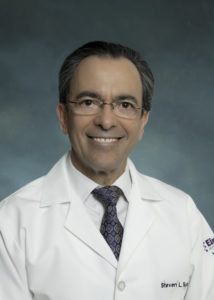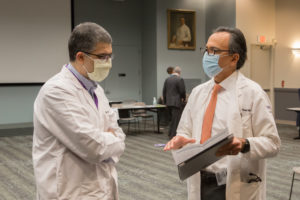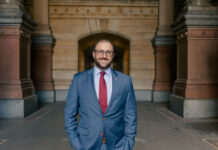
Before COVID, Dr. Steven Sivak was a veteran physician who had risen to the administrative level, overseeing the Einstein Healthcare Network’s practice locations and hospital patients in the Philadelphia medical center.
After COVID broke out, he became the medical equivalent of a wartime general, responsible for building pandemic processes on the fly and then, once the vaccine became available in December, organizing a community inoculation program on the fly, too.
The Jewish doctor rose to the unprecedented challenge, according to Einstein colleagues.
“The staff pulled together,” said Dr. Eric Sachinwalla, Einstein’s medical director for infection prevention and control.
“He said, ‘It’s not just about the people within our walls,’” recalled Juanita Way, who is running the network’s Tabor Road vaccine site. “‘It’s about the people in our community.’”
In the spring of 2020, Sivak’s goal was to prevent people from dying.
Einstein Medical Center Philadelphia was caring for 65 ventilator patients at a time, up from pre-pandemic norms of about 20. It also had a packed emergency room of about 200 patients.
Sivak, then 68, was meeting daily with his team and working 100-hour weeks. Despite their best efforts, like most hospital workers then, they saw a lot of deaths.
But, according to Sivak, Einstein’s death rate was lower than other area hospitals. And no Einstein employees got COVID infections from caring for sick patients.
Sivak attributed the success to processes that his team developed over those early months.
Einstein employees started screening people at the doors and enforcing pandemic rules, like mask-wearing and social distancing, inside facilities. They quarantined all positive patients into COVID-specific units.
They also started using all types of doctors, including cardiologists and other specialists, as critical care doctors. Sivak’s team even called up medical residents to the emergency room.
“We had to accommodate a sudden influx of critically ill patients that far exceeded our capacity to manage patients,” Sivak said.
By the winter, though, Sivak’s team was able to use vaccines to help people live again.
For the first month of the vaccination process, like most hospital systems, Einstein jabbed its essential workers. Using the Philadelphia hospital’s largest auditorium, Sivak’s team set up six vaccination stations, did 500 shots a day and inoculated 75% of the staff.
“It was exhilarating,” Sivak said. “You could feel a sense of relief come over the whole organization.”
After that first month, Einstein extended the shots to its most at-risk patients.
Then, Jewish Family & Children’s Service of Greater Philadelphia reached out and asked if the hospital could vaccinate area Holocaust survivors. So, Sivak’s team moved the operation to Einstein’s Elkins Park facility and vaccinated a few hundred survivors.
Later, Philadelphia asked the network to help inoculate SEPTA workers. So, Sivak’s team vaccinated between 800 and 1,000 of the region’s most essential employees.

“We were vaccinating anybody who came our way,” Sivak said.
Finally, the city gave Einstein a $300,000 grant to open the Tabor Road site. Almost 10,000 people have gotten vaccinated there, Way said. Einstein has vaccinated about 60,000 in all.
Sivak credited other hospital networks, like Jefferson Health, Temple Health and Penn Medicine, for playing significant roles in the local process, which has inoculated millions.
“Medical centers took on the role because the city didn’t have the infrastructure to do it,” Sivak said.
The doctor said his expanded role isn’t likely to scale back anytime soon, either. With the delta variant causing a new round of cases and restrictions, his goal now is to get everyone vaccinated.
“If you get it from the delta variant and are vaccinated, you’re very unlikely to end up in the hospital or die,” Sivak said.
[email protected]; 215-832-0740






